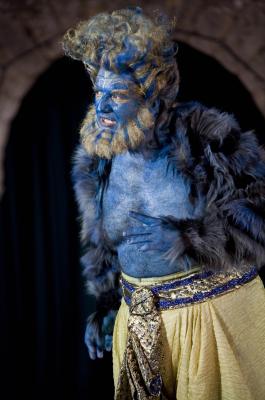|
<< -- 15 -- Roderic Dunnett WIT AND ORIGINALITY

One element that always seems profoundly stirring (at least to my ears) in German Singspiel of this period, from Die Entführung to The Flute to Fidelio, is the sound of the spoken German word. And there were a clutch of extended passages here at Garsington. This cast seemed particularly distinguished at it: indeed their proficiency and excellence in this respect helped the 'serious' side of the opera enormously.
More particularly, you can audibly sense how a straight spoken passage at Act II scene 8 of The Philosophers' Stone ('Lubano! Lubanara! Husband! Wife!') will metamorphose just a year later, thanks to Mozart's genius, into not merely sung recitative, but into Papageno's glorious 'pa-pa-' duet with Papagena. Even as a less seasoned spoken exchange here, it's great fun. There was another amusing moment in this Stone when, egged on by conductor Steuart Bedford, Melrose as Lubano, late in Act II, unexpectedly and anachronistically bursts into a cheerful and wicked parody of Papageno's jingle tune from Act I of The Flute.
Yet the comedy has a purpose. For what matters most in The Philosophers' Stone is that the audience receives a message not far removed from that of The Magic Flute: the idea of initiation, of a shaking-off, or sloughing, of an old life and an embarking, spiritually bettered, on a new.

Michael Druiett as the evil spirit Eutifronte. Photo © 2006 Johan Persson
|
The evil being Eutifronte (Michael Druiett) -- here Astromonte's bad brother (ie different from the complex relationship between Sarastro and the Queen of the Night), is also a comic figure of a Monostatos kind (you sense how Schikaneder came up with the intermediary Monostatos figure a year later, a sort of upright Caliban -- who is somewhat refined and sophisticated by many directors, which I find often confuses things), but somehow fails to define his role sufficiently. (The same possibly applies to Sadik, the intermediary priest figure at the start of The Stone: he needs clearer definition, a more certain identity of his own.)
Eutifronte needs to be a real force for evil: almost the incarnation of the Greek meaning of 'devil' (running converse or contrary) -- ie a disrupter of the natural or proper order of things, obsessed with activating a corrupting rival agenda (and the very opposite of his euphemistic name).
Continue >>
Copyright © 9 July 2006
Roderic Dunnett, Coventry UK

|

